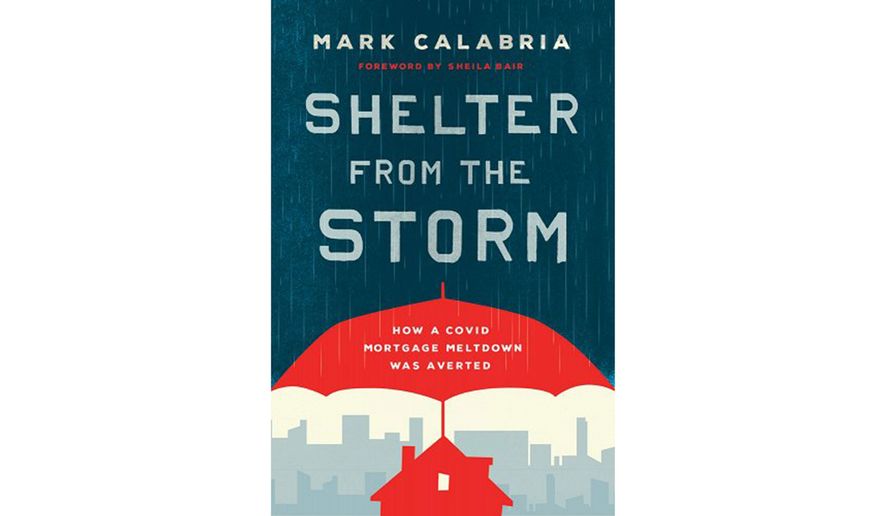OPINION:
In “The Wizard of Oz,” as Dorothy emerges from the tornado, she discovers her house has fallen on the Wicked Witch of the East. No doubt some viewers, seeing the legs, striped socks, and red shoes sticking out from under the base, wonder: Who owns the mortgage on that house?
Mark Calabria, head of the Federal Housing Finance Agency in the Trump administration, probably knows. FHFA is responsible for oversight of Fannie Mae and Freddie Mac, two giant government-sponsored enterprises integral to America’s housing finance system. The collapse of the housing market in 2007-2008 led the federal government to take these multitrillion-dollar institutions into receivership, where they remain under direct federal control to this day.
Mr. Calabria is an economist with a strong libertarian bent. He has worked at the Cato Institute and on housing issues at the Senate Banking Committee, and he was Vice President Mike Pence’s first chief economist before taking over at FHFA in April 2019.
As he recounts in his engaging and useful new book, “Shelter From the Storm,” he found a mess on his hands: “Fannie Mae and Freddie Mac were leveraged 1,000 to 1. The two companies had about $6 billion in equity behind about $6 trillion in risk. Any companies so highly leveraged would be certain to fail in a crisis.”
Mr. Calabria explains in clear, jargon-free prose what he did to reduce the risk these companies posed to taxpayers, the economy and millions of homeowners by making Fannie and Freddie build their capital and prepare for the day they could exit federal receivership with strong balance sheets, capable leadership and good business plans.
He had to fight through a minefield of vested interests and partisan politics. House Democrats were determined to keep programs and priorities just as they had been. Wall Street and the housing finance business fought his changes. Even some in the administration were uneasy. Nevertheless, Mr. Calabria put Fannie and Freddie on a strong path to an exit plan that would clean up one of the last problems of the 2007-2008 financial fiasco.
He helped homeownership levels recover across demographic groups after slumps from 2007 to 2015. Mr. Calabria points out that “the percentage of vacant single-family homes return[ed] to its long-run average of just over 1 percent by March 2020.”
But just when a booming economy and strong housing policies foreshadowed a bright future, COVID-19 hit and became the tornado that could have knocked Fannie and Freddie over. As businesses closed and employees lost their jobs, homeowners faced a crushing inability to pay their mortgages amid the dread and fear of millions that they could lose their homes.
Here, Mr. Calabria’s book becomes an inspiring explanation of how FHFA tackled an overwhelming challenge with principle, facts and creativity that avoided repeating many of the mistakes made after the 2007-2008 collapse.
Working with a brilliant team at FHFA and others in the administration, Mr. Calabria ensured that resources were sprinkled, not indiscriminately showered, on Fannie and Freddie. He drafted provisions of the Cares Act dealing with housing assistance that would actually work. He made sure stressed elements of the real estate market would be supported temporarily, but only with critical safeguards for taxpayers.
Mr. Calabria also created simple and straightforward forbearance policies for renters as well as owners.
His programs calmed real estate markets and the millions of Americans who might not only have lost a place to rest their heads but been consigned to complicated programs of federal aid and compensation involving years of uncertainty and concern.
Mr. Calabria’s work guaranteed against the terrible consequences of being evicted from your house or apartment, such as long-term homelessness, subpar housing opportunities, and crabbed economic futures due to destroyed credit. The COVID-19 tornado did not knock over Fannie and Freddie, torpedo the real estate market, or destroy people’s ability to keep a roof over their heads.
“Shelter From the Storm” casts a gimlet eye on many of the players and forces — public and private — which helped create the housing market as it is today. Mr. Calabria provides great guidance to any appointee newly empowered to lead in the executive branch. Aspiring policymakers would do well to study his points.
It’s probable that no one owned the mortgage on Dorothy’s house — her aunt and uncle seem like the sort of people who would have worked hard to pay it off as quickly as possible.
Similarly, Mr. Calabria’s hard work ensured that when it came to housing during the COVID-19 pandemic, Americans themselves didn’t end up like the Wicked Witch of the East. We owe him our thanks.
• Eric Ueland was an assistant to President Donald Trump for legislative affairs and deputy director of the Domestic Policy Council. He was also director of the Office of U.S. Foreign Assistance Resources at the State Department and a longtime Senate staffer.
• • •
Shelter From the Storm
by Mark Calabria
2023, Cato Institute, 234 pages, $27.95




Please read our comment policy before commenting.